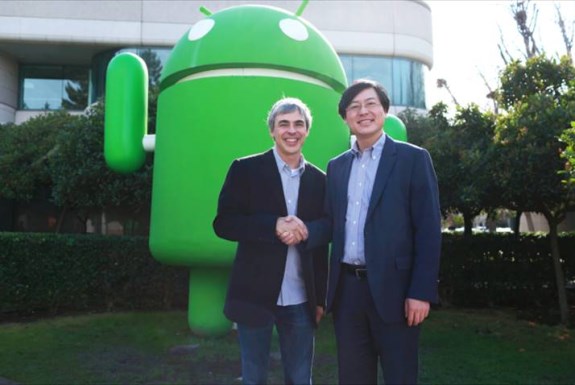
Last spring Google already sold off Motorola Home, Motorola Mobility's cable and video unit, to Arris Group for $2.35 billion. TechCrunch heard Google wanted to dump the asset for some time but had to hold off selling the loss-making division for tax reasons. Patents were the prime reason why Google bought Motorola Mobility but we can't help but wonder if this was one of Google's biggest financial mistakes to date.
Lenovo (HKSE: 992) (ADR: LNVGY) and Google (NASDAQ: GOOG) today have entered into a definitive agreement under which Lenovo plans to acquire the Motorola Mobility smartphone business. With a strong PC business and a fast-growing smartphone business, this agreement will significantly strengthen Lenovo’s position in the smartphone market. In addition, Lenovo will gain a strong market presence in North America and Latin America, as well as a foothold in Western Europe, to complement its strong, fast-growing smartphone business in emerging markets around the world.
The purchase price is approximately US$2.91 billion (subject to certain adjustments), including US$1.41 billion paid at close, comprised of US$660 million in cash and US$750 million in Lenovo ordinary shares (subject to a share cap/floor). The remaining US$1.5 billion will be paid in the form of a three-year promissory note.
Lenovo, which in 2005 acquired IBM’s PC business and its legendary PC brand, will now acquire world-renowned Motorola Mobility, including the MOTOROLA brand and Motorola Mobility's portfolio of innovative smartphones like the Moto X and Moto G and the DROIDTM Ultra series. In addition to current products, Lenovo will take ownership of the future Motorola Mobility product roadmap.
Google will maintain ownership of the vast majority of the Motorola Mobility patent portfolio, including current patent applications and invention disclosures. As part of its ongoing relationship with Google, Lenovo will receive a license to this rich portfolio of patents and other intellectual property. Additionally Lenovo will receive over 2,000 patent assets, as well as the Motorola Mobility brand and trademark portfolio.
Motorola Mobility enjoys outstanding brand awareness around the world, and is currently the #3 Android smartphone manufacturer in the U.S. and #3 manufacturer overall in Latin America.
“The acquisition of such an iconic brand, innovative product portfolio and incredibly talented global team will immediately make Lenovo a strong global competitor in smartphones. We will immediately have the opportunity to become a strong global player in the fast-growing mobile space,” said Yang Yuanqing, chairman and CEO of Lenovo. “We are confident that we can bring together the best of both companies to deliver products customers will love and a strong, growing business. Lenovo has a proven track record of successfully embracing and strengthening great brands – as we did with IBM’s Think brand – and smoothly and efficiently integrating companies around-the-world. I am confident we will be successful with this process, and that our companies will not only maintain our current momentum in the market, but also build a strong foundation for the future.”
“Lenovo has the expertise and track record to scale Motorola Mobility into a major player within the Android ecosystem. This move will enable Google to devote our energy to driving innovation across the Android ecosystem, for the benefit of smartphone users everywhere,” said Larry Page, CEO, Google.
“As part of Lenovo, Motorola Mobility will have a rapid path to achieving our goal of reaching the next 100 million people with the mobile Internet. With the recent launches of Moto X and Moto G, we have tremendous momentum right now and Lenovo’s hardware expertise and global reach will only help to accelerate this,” said Dennis Woodside, CEO, Motorola Mobility.
The transaction is subject to the satisfaction of regulatory requirements, customary closing conditions and any other needed approvals.

Larry Page (Google) & Yang Yuanqing (Lenovo)